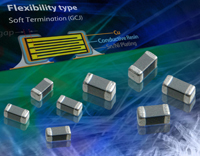By Murata Electronics 203

Based on Murata Electronics' leading GCM and GRM series of MLCCs for automotive applications, the GCJ series incorporates the company's "soft" termination technology.
When mounted on a board that is bent or flexed, either during the manufacturing process or in the field, MLCCs can develop cracks, affecting capacitor performance. The "soft" termination type reduces the risk of stress damage by applying a layer of conductive polymer within the capacitor's electrodes. It is the elasticity of the polymer that reduces the bending stress in the capacitor. In tests conducted by Murata, "soft" termination MLCCs were soldered with 200 µm thick solder to a typical 1.6 mm thick PCB. The board was then flexed. The soft termination versions typically did not suffer any stress damage after the board had flexed 5 mm.
The terminations of standard Murata MLCCs have three layers: the inner-most is copper, then nickel, with tin on the outside. In the GCJ series, after the copper layer is added, conductive polymer is applied to the outer electrode. Then the nickel and tin layers are added as normal. The process does not affect the equivalent series resistance (ESR) or current rating, so the GCJ series capacitors have the equivalent properties as their GRM series counterparts.
신제품:
GCJ21BR71C475KA01LGCJ31CR71C106KA15LGCJ21BR71H105KA01LGCJ21AR72E152KXJ1DGCJ21AR72E222KXJ1DGCJ21AR72E332KXJ1DGCJ21AR72E472KXJ1DGCJ21AR72E682KXJ1DGCJ21BR72E103KXJ3LGCJ31BR72E153KXJ1LGCJ31BR72E223KXJ1LGCJ31CR72E333KXJ3LGCJ31CR72E473KXJ3LGCJ32QR72E683KXJ1LGCJ32DR72E104KXJ1LGCJ43QR72E154KXJ1LGCJ43DR72E224KXJ1LGCJ55DR72E334KXJ1LGCJ55DR72E474KXJ1LGCJ31BR72J102KXJ1L